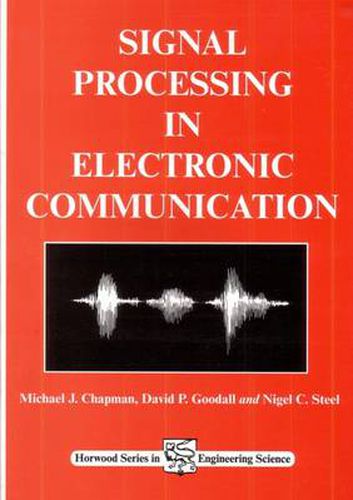Readings Newsletter
Become a Readings Member to make your shopping experience even easier.
Sign in or sign up for free!
You’re not far away from qualifying for FREE standard shipping within Australia
You’ve qualified for FREE standard shipping within Australia
The cart is loading…






This text deals with signal processing as an important aspect of electronic communications in its role of transmitting information, and the language of its expression. It develops the required mathematics in an interesting and informative way, leading to confidence on the part of the reader. The first part of the book focuses on continuous-time models, and contains chapters on signals and linear systems, and on system responses. Fourier methods, so vital in the study of information theory, are developed prior to a discussion of methods for the design of analogue filters. The second part of the book is directed towards discrete-time signals and systems. There is full development of the z- and discrete Fourier transforms to support the chapter on digital filter design.
All preceding material in the book is drawn together in the final chapter on some important aspects of speech processing which provides an up-to-date example of the use of the theory. Topics considered include a speech production model, linear predictive filters, lattice filters and cepstral analysis, with application to recognition of non-nasal voiced speech and formant estimation.
In addition to course requirement for undergraduates studying electrical engineering, applied mathematics, and branches of computer science involving such signal processing as speak synthesis, computer vision and robotics, this book should provide a valuable reference source for post-graduate research work in industry and academia.
An elementary knowledge of algebra (e.g. partial fractions) is a prerequisite, and also calculus including differential equations. A knowledge of complex numbers and of the basic concept of a function of a complex variable is also needed.
$9.00 standard shipping within Australia
FREE standard shipping within Australia for orders over $100.00
Express & International shipping calculated at checkout
This text deals with signal processing as an important aspect of electronic communications in its role of transmitting information, and the language of its expression. It develops the required mathematics in an interesting and informative way, leading to confidence on the part of the reader. The first part of the book focuses on continuous-time models, and contains chapters on signals and linear systems, and on system responses. Fourier methods, so vital in the study of information theory, are developed prior to a discussion of methods for the design of analogue filters. The second part of the book is directed towards discrete-time signals and systems. There is full development of the z- and discrete Fourier transforms to support the chapter on digital filter design.
All preceding material in the book is drawn together in the final chapter on some important aspects of speech processing which provides an up-to-date example of the use of the theory. Topics considered include a speech production model, linear predictive filters, lattice filters and cepstral analysis, with application to recognition of non-nasal voiced speech and formant estimation.
In addition to course requirement for undergraduates studying electrical engineering, applied mathematics, and branches of computer science involving such signal processing as speak synthesis, computer vision and robotics, this book should provide a valuable reference source for post-graduate research work in industry and academia.
An elementary knowledge of algebra (e.g. partial fractions) is a prerequisite, and also calculus including differential equations. A knowledge of complex numbers and of the basic concept of a function of a complex variable is also needed.